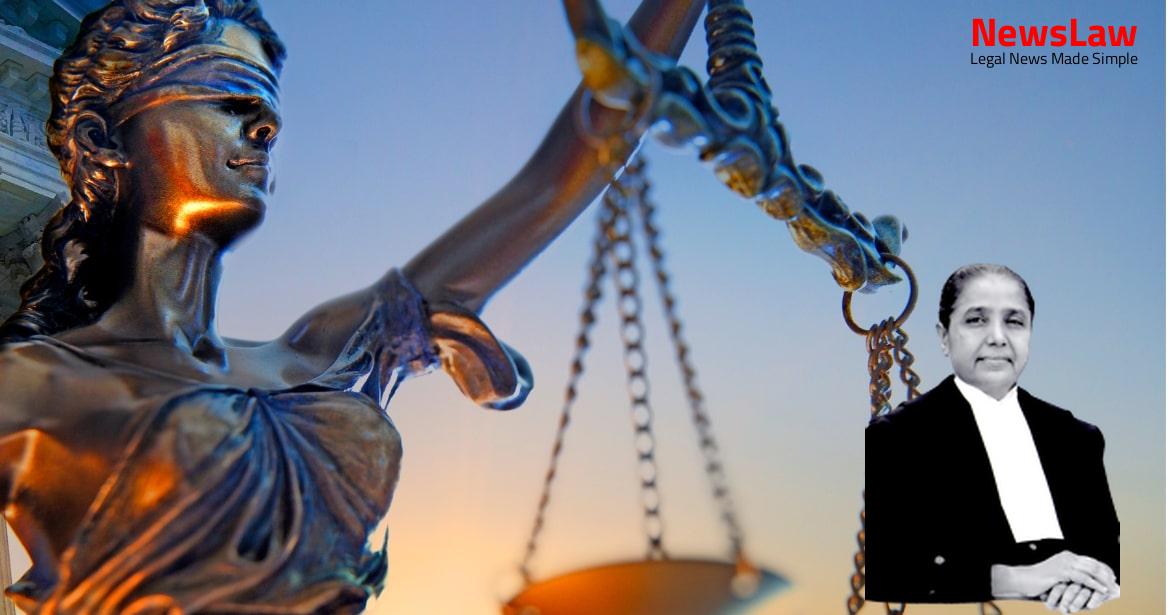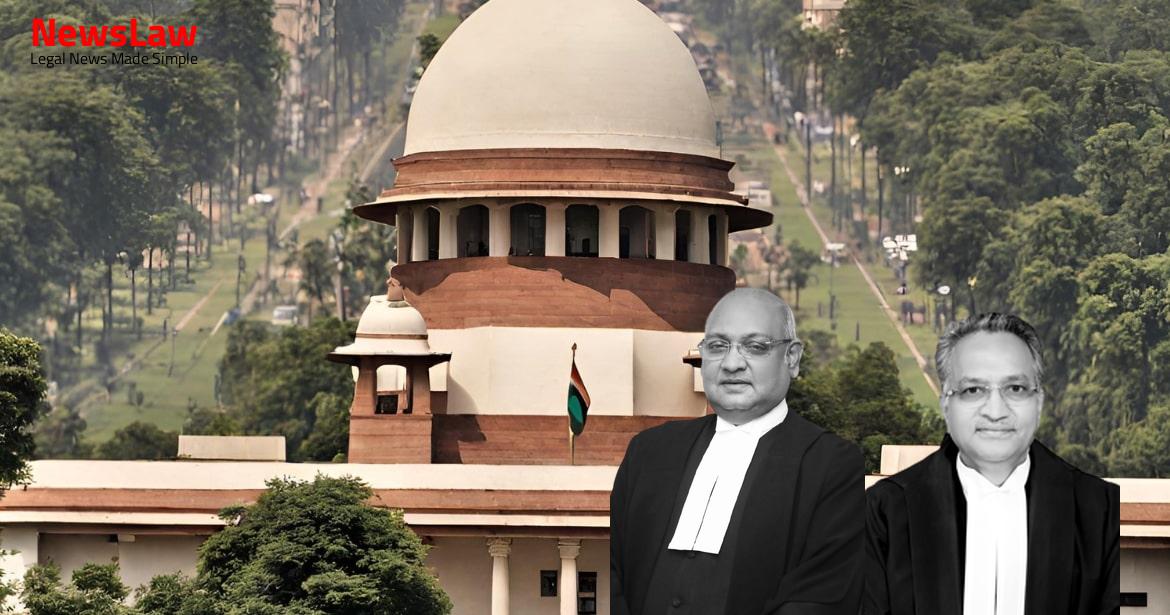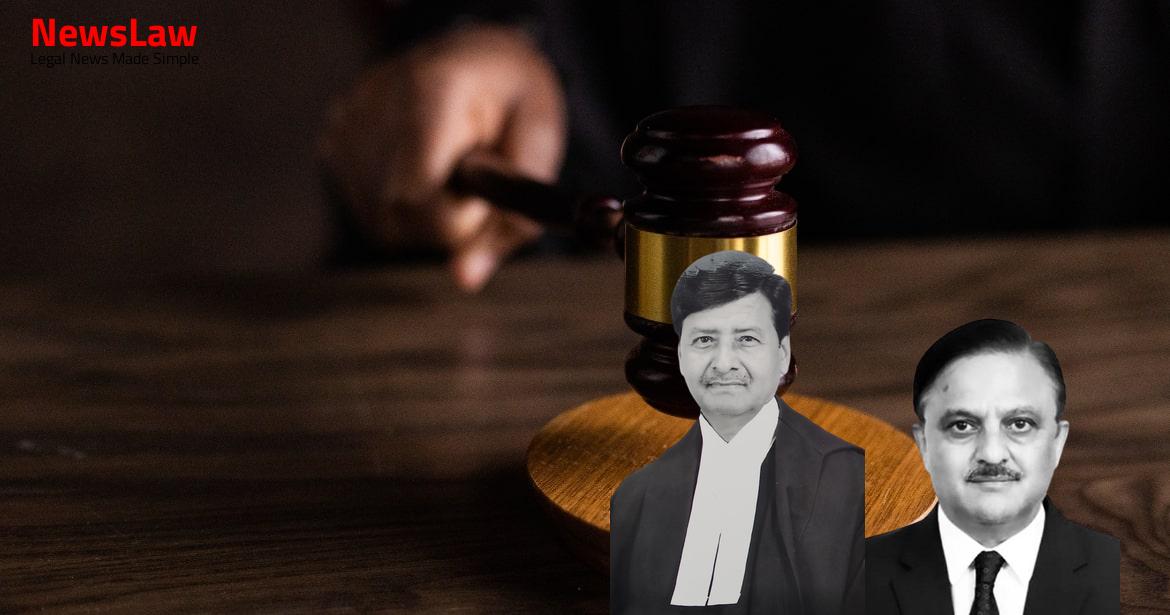In a significant legal battle, the Supreme Court has delivered a judgment in SLP(C) No. 9829 of 2017 concerning a dispute over financial assistance. The case revolves around a civil suit filed by the respondent-plaintiff against the appellant for repayment of a loan. Despite initial setbacks in lower courts, the appellant’s pursuit of legal remedies has led to this crucial judgment by the Supreme Court, shaping the future of the case. Dive into the details of this intriguing legal saga!
Facts
- SLP(C) No.9829 of 2017 was filed against the order which was dismissed by the Supreme Court
- The appeal arises from the order dated 24.04.2018 passed by the High Court at Madurai Bench
- High Court refused to condone the delay of 546 days in filing the first appeal against the judgment and decree passed in OS No.76 of 2015
- Appellant approached the respondent-plaintiff for financial assistance for business needs
- Cheques issued by the appellant were returned as ‘payments stopped by the drawer’
- Respondent-plaintiff filed a civil suit (OS No.76 of 2015) against the appellant
- Ex-parte decree was passed on 09.10.2015 as summons were allegedly sent to the appellant’s old address in Trichy
- Appellant learned about the decree on 29.07.2016 during a court case in Karur Court
- Appellant filed application under Section 5 of the Limitation Act to condone delay in filing petition under Order IX Rule 13 CPC to set aside ex-parte decree
- Appellant defended being a businessman in tea and real estate, residing in Chennai since 2014
- Dispute over repayment of the lent amount, with appellant agreeing to return but not doing so
- Earlier attempts to set aside ex-parte decree were unsuccessful in trial court, High Court, and Supreme Court
Also Read: High Court Acquittal Case of State of Uttar Pradesh v. Jai Prakash
Issue
- Appeal filed under Section 96(2) CPC against the ex-parte decree is in question
- Dismissal of application under Order IX Rule 13 CPC for condonation of delay
- Issue of maintainability of the appeal in light of the above dismissal
- Consideration of whether time spent in proceedings to set aside ex-parte decree can be deemed ‘sufficient cause’ under Section 5 of the Limitation Act, 1908
Also Read: Judgment Review: Supreme Court’s Ruling on the Capital Punishment Appeal
Arguments
- Appellant adduced documentary evidence to show he was not residing at the address where substituted service was affected
- High Court erred in dismissing application for condonation of delay filed with the first appeal
- Relied on the case of Bhivchandra Shankar More v. Balu Gangaram More to assert statutory right to appeal under Section 96(2) CPC
- First appeal filed was beyond the period of limitation according to the respondent
- Huge amount of Rs.45,00,000/- paid in cash raised doubts about transaction genuineness as per appellant’s counsel
- Lending of Rs.45,00,000/- as hand loan substantiated by issuance of two post-dated cheques in favor of the respondent by the appellant
Also Read: The Ruias v. MHL: Landmark Supreme Court Judgement
Analysis
- The appeal under Section 96(2) CPC is a statutory right and cannot be deprived based on the dismissal of an application under Order IX Rule 13 CPC.
- The defendant can pursue both the remedies simultaneously, i.e., file an appeal under Section 96(2) CPC and an application under Order IX Rule 13 CPC.
- If the appeal under Section 96(2) CPC is dismissed, the defendant cannot subsequently file an application under Order IX Rule 13 CPC as the original decree merges with the appellate court’s decree.
- The court may decline to condone the delay in filing the first appeal if dilatory tactics are adopted by the defendant.
- The defendant’s pursuit of an application under Order IX Rule 13 CPC does not prevent him from later filing an appeal under Section 96(2) CPC if the application is dismissed.
- The defendant has the right to appeal the original ex-parte decree under Section 96(2) CPC based on statutory rights.
- Dichotomy exists where the defendant cannot challenge the trial court’s decision for an ex-parte hearing in the appeal but can argue on the merits of the suit.
- Courts have previously held that the Explanation in Order 9 Rule 13 CPC should receive a strict construction.
- The scope of Order 9 Rule 13 CPC and Section 96(2) CPC is different, with the former concerning service of summons and the latter dealing with appeals from ex-parte decrees.
- The defendant’s pursuit of remedies must be bona fide, and if the court refuses to condone delays, the statutory right to appeal cannot be deprived.
- The right of appeal is a statutory right and cannot be deprived of the litigant.
- The right to question the correctness of the decree in a first appeal is a statutory right.
- The right of appeal under Section 96(2) CPC is a statutory right and cannot be deprived merely on the ground of dismissal of an application under Order IX Rule 13 CPC.
- The defendant against whom an ex-parte decree is passed has two options.
- A right shall not be curtailed unless the statute expressly or by necessary implication allows it.
- An embargo shall not be fixed on a right without a clear provision in the statute.
- Any restriction or limitation on a right must be explicitly stated in the law.
- The appellant deserves an opportunity to put forth his defense in the suit for recovery of money.
- The appellant has shown bona fide by depositing Rs. 25,00,000/- in compliance with the court orders.
- The court is not inclined to go into the merits of the contention of the parties.
- It would have been beneficial for the appellant to file the first appeal simultaneously along with the application under Order IX Rule 13 CPC.
Decision
- To avail the opportunity, the appellant must deposit Rs.20,00,000/- as a condition precedent for condonation of delay
- On depositing Rs.20,00,000/-, the judgment by Madurai Bench of Madras High Court is set aside, and the appeal is allowed
- The deposited amount will be invested for six months with auto-renewal provision
- Both the deposits of Rs.20,00,000/- and Rs.25,00,000/- are subject to the appeal’s outcome
- Criminal complaints filed under Section 138 of NI Act to proceed without being influenced by the court’s views
- Rs.25,00,000/- earlier deposited was allowed to be withdrawn by the respondent-plaintiff
- No opinion on the merits of the matter has been expressed
- Delay of 546 days in filing the first appeal is condoned on the condition of depositing Rs.20,00,000/- by 28.02.2020
- The appeal is to be proceeded with by the High Court in accordance with law
- The impugned judgment is liable to be set aside in these terms
Case Title: N. MOHAN Vs. R. MADHU
Case Number: C.A. No.-008898-008898 / 2019



